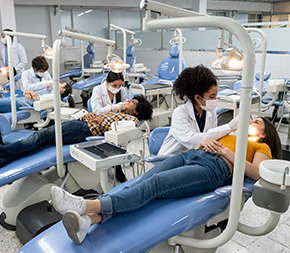In this Article

Completing a dental assisting program is the best way to gain the knowledge and skills you’ll need to succeed in this allied health field. You can choose from dental assisting programs that lead to a certificate/diploma or an associate degree. In choosing between these options, you’ll want to consider factors such as time, cost, and your long-term career goals.
Education Options for Dental Assistants
Whether you choose a certificate/diploma or an associate degree in dental assisting, both educational programs can prepare you to begin your career as a general dental assistant and qualify you for professional certification.
A certificate/diploma program concentrates on the basics of dental assisting. This allows you to save time and money by streamlining your education so you can begin working as quickly as possible, usually within a year. While an associate degree can take two years to complete, it combines basic dental assisting knowledge with core college courses for a well-rounded education that may be good for career growth.
Both a certificate/diploma program and an associate degree can serve as sound foundations for a career in dental hygiene, dental lab science, or another allied health role. College credits earned for an associate degree from an accredited institution can be transferred to other accredited institutions for further education. Training and education earned in a certificate/diploma program may be applied toward another program or an associate degree if the new program offers credit for prior learning and experience.
“With dental assisting, there is not necessarily a typical career progression, but there are many options for career development,” says Hanna Aronovich, chief marketing and communications officer with the Dental Assisting National Board (DANB) and the Dental Advancement through Learning and Education (DALE) Foundation. “Dental assistants who gain education, experience, and meet state requirements can become eligible to perform expanded functions or other additional duties depending on their state.”
Popular Pathways
Here’s a closer look at the two educational pathways to become a dental assistant.
Certificate and Diploma Programs
Most dental assistants begin their careers by completing a certificate or diploma program.
Locations
Prerequisites
Curriculum
The curriculum of an accredited dental assisting program must include a minimum of 900 instructional hours, including 300 clinical practice hours.
Time to Complete
Nine to 11 months of full-time study
Clinical Work
A minimum of 300 hands-on clinical hours in two or more dental offices or clinics
Who Is this Type of Program Best For?
A dental assisting certificate program is best for students who want to enter the job market as quickly as possible. It can also benefit students who want to test the waters before spending more time and money on a two- or four-year degree.
If your goal is to move on from dental assisting to a career in dental hygiene, you may be able to apply some of your education or professional experience toward a dental hygiene program if they offer credit for prior learning and experience. In this case, you may be able to test out of introductory courses in programs.

A dental assisting certificate program is best for students who want to enter the job market as quickly as possible.
Associate Degree
An associate degree combines dental assisting training with core college courses for a well-rounded education.
Locations
Prerequisites
Curriculum
The curriculum of an accredited dental assisting program must include a minimum of 900 instructional hours, including 300 clinical practice hours.
Time to Complete
Two years of full-time study
Clinical Work
A minimum of 300 hands-on clinical hours in two or more dental offices or clinics
Who Is this Type of Program Best For?
An associate degree is best for students who plan to use dental assisting as a stepping stone to other allied health roles. If your goal is to move on from dental assisting to a career in dental hygiene, you can typically transfer courses from one accredited school to another. This can be beneficial for students who plan to pursue a career in dental hygiene or another allied health field that requires a two- or four-year degree.

An associate degree is best for students who plan to use dental assisting as a stepping stone to other allied health roles.
Some programs also allow you to apply your professional experience toward another allied health program if they offer credit for prior learning and experience. This makes it possible to test out of introductory courses by earning credit by examination.
Online Programs
Online dental assisting programs typically allow you to complete non-clinical coursework online at your convenience, though you may have to attend some classes in person.
Since accredited dental programs include a minimum of 300 hands-on clinical hours, you’ll still have to complete part of your program outside of your home. No matter where they are based, most online dental assisting programs allow you to complete lab requirements in locations in your area.
The prerequisites and curriculum of an online program mirror onsite certificate and associate degree programs. Some online programs may permit you to progress at your own pace, giving you the option to move on as you achieve set competencies rather than working within traditional semesters. This can help you finish your program faster than the times required for an onsite certificate or associate degree.
Dental assisting students who must work or maintain family responsibilities while they study may benefit from the flexibility of online programs.
What to Look for in a School
Whether you opt for a certificate program or an associate degree, make sure you meet eligibility criteria for the certification you need to achieve your goals.
“A prospective dental assistant should verify that the program they are enrolling in is accredited by the state the dental assistant will be employed in and that it will meet the requirements to allow the student upon completion to perform the duties of a ‘recognized’ dental assistant in their state,” says Susan D. Bentley-Camizzi, CDA, BSDH, MSEd, president-elect of the American Dental Assistants Association (ADAA).
Accredited Dental Assisting Programs
Accreditation means a program offers an education that will prepare you for your field. To earn accreditation, a program is evaluated by an independent accrediting body. The Commission on Dental Accreditation (CODA) is the organization responsible for accrediting dental assistant programs.
Accreditation is awarded to a dental program across all formats. That means both an online and classroom-based program will be accredited. It’s important to note that a CODA-accredited program must include a minimum of 300 in-person clinical hours, even if the curriculum is offered online.
As a prospective student, selecting an accredited dental assisting program can help you:
- Feel assured that you’re receiving a strong education
- Earn credits that can be transferred between schools
- Create employer confidence in your educational credentials
- Provide access to dental assisting scholarships and government financial aid
Attending an accredited program is also important if you want to advance your education—for example, pursue coursework to become a dental hygienist.
Can You Become a Dental Assistant Without Program Accreditation?
You can, but it’ll take you longer to earn a certification, a credential that tells others you have deep knowledge in your field. While not necessary, a credential could give you a professional advantage and may lead to a higher salary.
Immediately following graduation from an accredited program, you’re eligible to take the Certified Dental Assistant (CDA) exam given by the Dental Assisting National Board (DANB).
However, if your program isn’t accredited, you’ll need to complete a minimum of 3,500 hours of approved work experience before you’ll be able to qualify. It’s important to consider that 3,500 hours equates to over one and a half years of full-time work, based on a 40-hour workweek.
Does the Program You’re Looking at Prepare You to Work in Your State?
Whether you choose to pursue a diploma program or an associate degree, ensure that your education will qualify you to work as a dental assistant in your state.
“Graduating from a dental assisting program that is accredited by the Commission on Dental Accreditation (CODA) is often recognized or required by states as one of the steps to earn registration or licensure,” Aronovich says. “Additionally, graduating from a CODA-accredited program is one of the pathways to be eligible to earn DANB’s CDA certification.”
“If there is not a CODA-accredited program in your area, look for a dental assisting program that is accredited by an agency recognized by the U.S. Department of Education or recognized by the state dental board,” Aronovich says.

Whether you choose to pursue a diploma program or an associate degree, ensure that your education will qualify you to work as a dental assistant in your state.
Certifications
States vary on the need for dental assistants to be certified and/or licensed. Certification is a professional credential that proves you’ve demonstrated mastery of the knowledge and skills necessary to work in a specific role. It’s awarded by a professional organization to candidates who meet the education, experience, and examination requirements for a specific certification.
The CDA credential is the national certification for general dental assisting. A certification differs from a license, which is a mandatory credential issued by a government agency that regulates a specific field.
Though most states don’t require certification to work as an entry-level dental assistant, many states have requirements, including certification, that dental assistants must meet to perform specialized tasks, such as taking X-rays. In addition, if your state requires a license, you may or may not need a certification.
The DANB is the nationally recognized certification organization for dental assistants. Here are four popular certifications for dental assistants.
| Certification | Who It’s For |
|---|---|
| Certified Dental Assistant (CDA) | Dental assistants who want to demonstrate competency in general dental assisting knowledge and skills |
| Certified Orthodontic Assistant (COA) | Dental assistants who want to assist in orthodontic care |
| Certified Preventive Functions Dental Assistant (CPFDA) | Dental assistants who want to assist in preventive care, including polishing, sealants, and topical fluoride |
| Certified Restorative Functions Dental Assistant (CRFDA) | Dental assistants who want to assist in restorative dentistry, including impressions and dental fillings |

Written and reported by:
Anna Giorgi
Contributing writer

With professional insight from:
Susan D. Bentley-Camizzi, CDA, BSDH, MSEd
American Dental Assistants Association, President-Elect
Infection Control Monitor, School of Dental Medicine, University at Buffalo
Dental Assisting Program Director, Retired

Hanna Aronovich
Chief Marketing and Communications Officer
Dental Assisting Board and the DALE Foundation